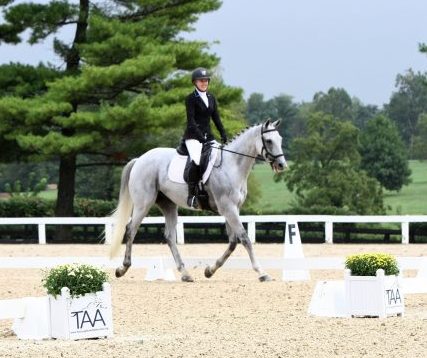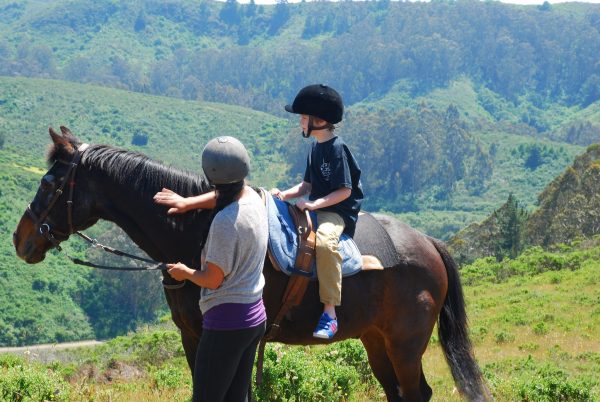What is an OTTB?
“OTTB” stands for off-track Thoroughbred. An off-track Thoroughbred is a horse that was bred and trained to be a racehorse and is now not an active racehorse. Many OTTBs are registered with The Jockey Club. The Jockey Club is the breed registry for Thoroughbred horses in North America.

An OTTB competing at a horse show. Suzie Oldham photo.
A horse doesn’t need to make a certain amount of starts on the racetrack to be considered an OTTB. Some OTTBs have made 50 or more starts, while some haven’t made any. Horses retire from racing and training for various reasons. Some horses don’t show a willingness to compete on the track and some have injuries that do not allow them to continue to race. Reason for retirement isn’t always indicative of whether a horse will be successful in a new career off the racetrack. Many OTTBs successfully rehab and reach high levels of competition in other equestrian disciplines. The Thoroughbred Aftercare Alliance has 81 accredited aftercare organizations that offer rehab programs.
Some horses have injuries that end their racing careers but are not limiting to their careers off the track. For example, Stormin Eddie had a bowed tendon and is now competing successfully in dressage; and Big Deuce had a rare muscle condition but was rehabbed and retrained for Pony Club and the hunter/jumper ring. Working with an experienced veterinarian and a TAA-accredited aftercare organization can help determine what an OTTB could be potentially capable of off the track.
OTTBs for Sale
OTTBs have proven to be great mounts for a number of equestrian disciplines. Thoroughbreds’ key characteristics are athleticism, speed, and heart, which makes them very suitable for other equestrian disciplines. Due to their versatility, OTTBs have become five-star eventers, champion hunter/jumpers, competitive barrel racers, and reliable trail partners. Read more about OTTBs finding success off the track through TAA-accredited organizations here.
Adoption fees for OTTBs can range from hundreds to a few thousand dollars or more. A variety of factors contribute to the adoption fee of an OTTB including confirmation, soundness, level of training, and location of the organization. However, don’t let the price tag be your only indicator of which OTTB is right for you. OTTBs need time to let down after leaving the racetrack and adapt to their new lifestyle. With the proper care and patience, OTTBs can blossom in second careers that might have seemed unlikely for them when they were fresh off the track.
The Thoroughbred Aftercare Alliance has 81 accredited aftercare organizations that offer adoption programs. Considering adopting an OTTB? Find a TAA-accredited organization near you and speak to them about your equine goals.
Why OTTBs
There are many misconceptions about OTTBs, especially regarding their temperament and suitability for careers away from the racetrack.

An OTTB in an equine-assisted program.
However, Thoroughbreds are versatile and diverse, ranging in color, size, temperament, and energy level. In general, the breed has a strong competitive drive and can be people pleasers. Of course, every horse is different.
These characteristics also make OTTBs ideal equine partners for a variety of riding disciplines and equestrian activities. TAA-accredited aftercare organizations lead the way in finding new homes and careers for these horses. Read more of their stories here.
Some OTTBs have risen to the top-levels of equine competition. For example, Blackfoot Mystery made three starts on the track before being retired and retrained for eventing. The gelding has competed with Boyd Martin in numerous international events, such as the 2016 Olympics in Rio de Janeiro and the 2016 Rolex Kentucky Three-Day Event.
On the opposite side of the spectrum, multiple grade 1 winner and millionaire Game on Dude is now part of a living tourism destination at TAA-accredited Old Friends. While Jackhammer, a graduate of TAA-accredited After the Homestretch, is trail riding partner and equine best friend for his adopter.
Other OTTBs have transitioned into not-so-typical careers. Tizrobertcharles, a winner on the track and grad of TAA-accredited Florida TRAC, became a police horse who regularly patrols large events in South Florida. A one-time movie star thanks to his role in “Seabiscuit,” Fighting Furrari is now a member of the herd at TAA-accredited Square Peg, which specializes in equine-assisted services for individuals with Autism.
OTTBs are further proving that they aren’t just one-trick ponies as the Thoroughbred aftercare movement grows. Eventers, champion show hunters, lightning-fast barrel runners, sensitive therapy companions. You name it, OTTBs are doing it.













